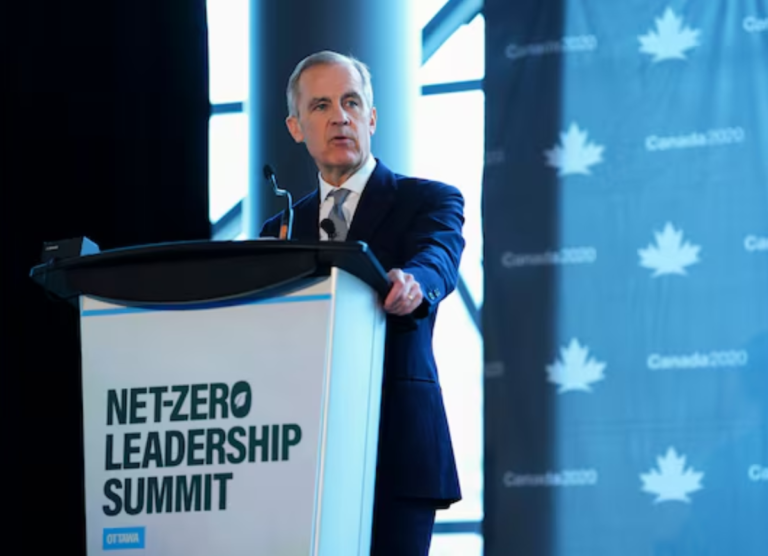
Mark Carney’s win signals a turning point for climate policy in Canada. Carney, the former Bank of Canada and Bank of England governor1, has long framed climate change as not just an environmental threat, but a systemic financial risk. From helping launch the Task Force on Climate-related Financial Disclosures (TCFD)2 to rallying over $130 trillion in assets under the Glasgow Financial Alliance for Net Zero (GFANZ)3, Carney has led the global charge to link sustainability with capital markets and has long warned that climate change poses systemic risks to the economy.
Now, he’s in a position to act on those warnings, and businesses need to be ready.
For sustainability leaders, SMEs, and forward-thinking executives, this means more than talk. It means regulation, investment, and competitive advantage will increasingly align with carbon performance
Carney’s platform is a blueprint for how Canada will build, power, and finance its next-generation economy. For business leaders, this moment is both a signal and an invitation to lead. Now is the time to:
Firms that act now will be better positioned to secure funding, meet regulatory expectations, attract top-tier partners, and build long-term competitiveness in a net-zero economy.
And if you’re not sure where to start? That’s where we come in.
At YellowYellow, we help forward-thinking businesses make clean economy ambitions real – without the greenwashing. From carbon credit strategy and emissions reporting to EV infrastructure, grant applications, and fuel credit monetization, we turn policy into practical results.
The clean economy is here. Let’s make your business a leader in it.
Book a call with YellowYellow to get started. This is your moment to lead.
References:


Kaitlyn D’Lima holds both a Bachelor of Business Administration and a Master of Science and Sustainability Management degree from the University of Toronto. She is also trained in greenhouse gas (GHG) accounting.
She brings extensive experience in sustainability and business transformational projects. She is known for her ability to execute projects of any size with both urgency and accuracy. Kaitlyn has a natural talent for improving stakeholder engagement. She’s a real trailblazer when it comes to benchmarking and research.
Kaitlyn is a runner who participates in outdoor adventure races.

Arun B Pazhayannur holds a degree in mechanical engineering and is a Chartered Accountant. He also has an MBA from the Ivey Business School at the University of Western Ontario. Along with his academic achievements, he has a thorough knowledge of Environmental, Social and Governance (ESG) principles, which he incorporates into his consulting work.
Arun is well-known for his leadership abilities as well as his strong skills in data analysis, financial modeling, and operations management. He has been recognized for his ability to identify practical solutions and deliver value to clients ranging from banks to payment companies to software providers. Arun is also a past President of Toastmasters Club.
In his free time, Arun enjoys scuba diving.In his spare time, Arun likes to scuba dive.

Gregory Donovan is a Chartered Accountant. He is a Fundamentals of Sustainable Accounting (FSA) Credential Holder. He obtained an Honours in Business Adminstrations (HBA) from the Ivey Business School (Western University) and a Master or Laws (LLM) from the London School of Economics. Gregory is the CEO of Avondale Private Capital, a sustainable finance firm focused on energy transition finance and carbon markets. He has presented on these topics at conferences in Canada, the US and UK.
Greg participates in the occasional triathlon and loves to go skiing and sailing with his two young children.

Margaux Loptson holds a Bachelor of Arts (Psychology) and a Bachelor of Arts (Criminology) from Pennsylvania State University. In addition, she holds several research certifications, including Ethical Conduct for Research Involving Humans.
She has been an essential player in AI-powered teaching and learning projects as a User Experience (UX) lead. Margaux is known for applying her design thinking, problem-solving and analytical skills to make a positive impact. She is a native French speaker.
Margaux is a fitness enthusiast who can be found hiking around Central Park in NYC.

Ritika Jain holds a Masters in Environmental Sciences, Policy and Management from Lund University (Sweden) and a Bachelor of Technology from Indraprastha University (India). As a lifelong learner, she is pursuing a Graduate Diploma in Corporate Social Responsibility and Sustainability at the University of Toronto.
Ritika is a recycling and responsible supply chain specialist. Through her work, she collaborates with organizations to implement circular economy focused policies to ensure compliance with regulations.
Her proficiency in data analytics and with the Global Reporting Initiative (GRI) enable her to manage complex sustainability data. Ritika also volunteers with the UN Sustainable Development Solutions Network, engaging with youth to drive positive change.
Ritika is a native Hindi speaker. She is a certified hiking leader who enjoys travelling.

Jonathan Spence holds an Honours Bachelor of Integrated Sciences (Earth and Environmental Sciences) from McMaster University and has his certification in Geographic Information Sciences from the ESRI Canada Center of Excellence at McMaster University. Jonathan worked as a research analyst in the environment and sustainability group for a TSX listed company.
He is pursuing his Ph.D. in Earth and Atmospheric Sciences at the University of Alberta, where he is researching the development of carbon capture techniques and their applications to the mining industry. Jonathan is focused on helping companies to minimize their carbon footprint while supporting their economic growth.
Jonathan is an avid water polo player and coach. He plays for the local National Championship League team.

Gurnoor Gandhi holds an MBA from Ivey Business School (Western University) and a postgraduate diploma in Maritime Energy Management (Sweden). Gurnoor brings experience with sustainability frameworks including TCFD, GRI, and CDP and is pursuing FSA credential (SASB).
Gurnoor has global leadership experience in the shipping industry managing assets worth millions of dollars on the high seas and has led diverse teams worked in Monaco, Singapore, and India. Most recently, he led organizational development and client partnerships at CARD, a non-profit focused on rural development and renewable energy.
Gurnoor brings a blend of technical and leadership skills. He applied his knowledge of greenhouse gas accounting and carbon capture to support clients with niche energy transition projects. He is known for putting his problem-solving, stakeholder management, and project management skills to work to help firms expedite their ESG Journey.
Gurnoor is a certified BMW adventure motorcyclist who finds off-road rides rejuvenating for body and spirit. He enjoys hiking with his family.

Lisa Annabel Ellis holds an Honours Bachelor of Science (Environmental Science) from the University of Toronto and an MBA from the Ivey Business School (Western University). She is a certified Project Manager Professional (PMP) with a Six Sigma Green Belt. Lisa is a Fundamentals of Sustainable Accounting (FSA) Level II Candidate. Applying her deep expertise in business and operational strategies, she has led award-winning transformational initiatives.
Drawing on her well-rounded science and finance expertise, she launched YellowYellow to help clients advance their sustainability practices. As an advocate of transparency and good governance, she partners with clients to understand their risks and opportunities to generate superior long-term value. Stakeholders across the value chain recognize the impact of this effort. She has been called upon to be a keynote speaker and lecturer.
Lisa is an advanced scuba diver who enjoys most water-related sports.